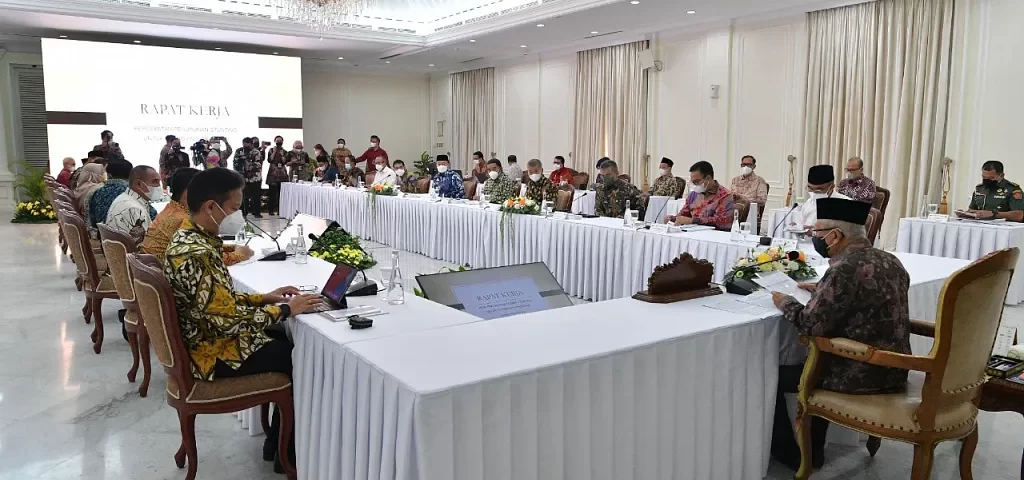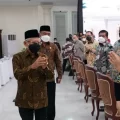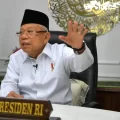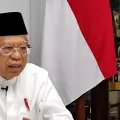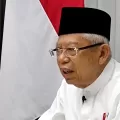Jakarta, wapresri.go.id – Vice President (VP) K.H. Ma’ruf Amin, as the Head of the Steering Committee for the Acceleration of Stunting Reduction (TP2S) assured the government’s commitment to accelerate the reduction of the 60 percent stunting rate to children under-fives in Indonesia, which spread across 12 priority provinces. To that end, this morning the VP chaired a Coordination Meeting with the Governors and all stakeholders from the relevant ministries at the Vice Presidential Palace, Jl. Medan Merdeka Selatan Number 6, Jakarta, Thursday, (04/08/2022).
During the meeting, the VP wanted to ensure that intervention programs and activities to accelerate stunting reduction in 12 priority provinces could be carried out in a convergent, holistic, integrated, and quality manner so that the prevalence target of 14 percent in 2024 could be achieved.
The establishment of 12 priority provinces for accelerating stunting reduction is based on the results of the Indonesian Nutrition Status Study (SSGI) conducted by the Indonesian Ministry of Health in 2021. There are 7 provinces with the highest stunting prevalence, namely East Nusa Tenggara (NTT) 37.8 percent, West Sulawesi 33.8 percent, Aceh 33.2 percent, West Nusa Tenggara (NTB) 31.4 percent, Southeast Sulawesi 30.2 percent, South Kalimantan 30.0 percent, and West Kalimantan 29.8 percent. Meanwhile, there are also 5 provinces with the largest number of stunting toddlers, namely West Java 971,792, Central Java 651,708, East Java 508,618, North Sumatra 347,437, and Banten 268,158.
In front of the Governors and regional representatives who were present, the VP conveyed several directions.
First, the VP requested that the good practice be continued and expanded in regional scope. Therefore, the Governors should focus on specific and sensitive interventions that are still low in coverage, including increasing the ownership of health insurance, especially for poor families, the use of modern family planning tools, consumption of iron tablets, and Early Childhood Education (PAUD), all of which have an impact significantly on reducing the prevalence of stunting.
Second, he requested that the good innovations that have been carried out by the regions be continued and sharpened so that they are right on target and have a wide coverage area. So, the results can really be seen and felt by families at risk of stunting, and local government can focus on interventions in the low coverage area.
Third, the VP also urged for the planning and budgeting system to be prepared based on evidence and data, so it can really identify the problems. The VP also emphasized that planning and budgeting should continue to be sharpened and synchronized from the village/suburb, district/city, provincial level to the ministry/institutional level so that inter-program convergence can be achieved. The synchronization must also be coordinated with the Ministry of Finance and Ministry of Planning.
Fourth, it is necessary to optimally use the budget that has been allocated both through ministries and agencies, as well as through transfers to regions, especially the Special Allocation Fund and Village Fund, and those that have been allocated in the APBD and APBDesa to support the acceleration of stunting reduction.
Fifth, the VP also asked for improvements in the implementation of community assistance in the field through strengthening Family Assistance Teams (TPK) in all villages/suburbs to synergize with Human Development Cadres (KPM) and Posyandu Cadres. This is because efforts to accelerate stunting reduction require inter-program and inter-actor convergence. For this reason, Governors must provide support and facilities TPK, KPM, and Posyandu Cadres so all are able to work in harmony.
Sixth, improvement of data quality starting from the field level needs to be done immediately. This, explained to the VP, could be done through the process of completing the monitoring equipment for child growth and development in each Posyandu and strengthening field assistants in monitoring growth so that the measurement results and data management become more accurate. In addition, it is also necessary to integrate various data collection and reporting systems that are currently scattered across ministries/agencies, to be utilized in planning, budgeting, monitoring and evaluation from the village/suburb level to the central level.
Seventh, the VP requested that cooperation and partnerships with non-governmental institutions be continuously improved, both from universities and research institutions, private sector and philanthropists, professional organizations, non-governmental organizations and development partner institutions in the implementation of accelerating stunting reduction in their respective regions.
In this meeting, also present and giving directions were the Coordinating Minister for Human Development and Culture, the Minister for National Development Planning/Head of Bappenas, the Minister for Home Affairs, the Minister for Finance, the Minister for Health, and the Head of the National Family Planning Coordinating Board (BKKBN).
Meanwhile, the Governors who were present and several representatives submitted brief reports on the progress of accelerating stunting reduction in their respective regions, the problems and obstacles faced, and the support that needed to be strengthened to achieve the 14 percent prevalence target by 2024.
Also attending this meeting were Coordinating Minister for Human Development and Culture Muhadjir Effendy, Minister of Finance Sri Mulyani, Minister of Health Budi Gunadi Sadikin, Head of BKKBN Hasto Wardoyo, Governor of Aceh Achmad Marzuki, Governor of North Sumatra Edy Rahmayadi, and Acting. Governor of Banten Al Muktabar.
Meanwhile, the VP was accompanied by the Head of the Vice Presidential Secretariat Ahmad Erani Yustika, Deputy for Human Development Policy Support and Development Equity at the Vice President’s Secretariat Suprayoga Hadi, Special Staff to the Vice President Masduki Baidlowi, M. Nasir, M. Imam Aziz, and Assistant Deputy for Poverty Reduction at the Vice President’s Secretariat Abdul Muis. (NN,/LHS BPMI – Setwapres)

